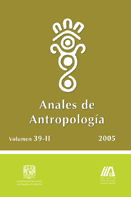Jíkuri sepawa'ame (la " raspa de peyote"): una danza de curación en la sierra Tarahumara
Main Article Content
Abstract
The “raspa del jíkuri” or peyote, rite of treatment of the soul between rarámuri of the Mexican northwest, is the object of analysis of this essay. In him, the ethnographic data in function 1) of an internal discursiva logic to the considered group are interpreted, cradle in the joint of the properties of the ritual text with those of the explicit and implicit context; and 2) based on an external, intercultural discursiva logic, letter to the analytical dialogue with other texts, other ritual variants that comprise of the same system. The conductive axis of the analyzed representation is the indigenous preoccupation to establish, to recover or to reaffirm a correct relation between the psychic order and the cosmic order within ritual determining and of a certain therapeutic system.
Downloads
Article Details
How to Cite
Bonfiglioli, C. (2009). Jíkuri sepawa’ame (la " raspa de peyote"): una danza de curación en la sierra Tarahumara. Anales De Antropología, 39(2). https://doi.org/10.22201/iia.24486221e.2005.2.9970
Citas en Dimensions Service
Esta revista usa una licencia CC del tipo CC BY-NC-ND 3.0. Se maneja bajo el esquema de acceso abierto, con una licencia Creative Commons Attribution-NonCommercial-NoDerivs 3.0 Unported.
